Volunteers have been in the kitchen since morning—chopping vegetables, making sauces, prepping chicken. A second crew arrives mid-afternoon to clean the kitchen and set up tables and chairs.
Making dinner for 70 people every Monday night, on a shoestring budget of just $100 a meal, is no easy task. But it's one that Sylvia Thorburn and her team of volunteers handle with grace, bringing together a group that's as lively as it is diverse.
“We've got all kinds of people from the community, across age ranges, ethnicity, income brackets,” says Captain Michael Ramsay, who developed the program with Thorburn while he was serving as the corps officer in Swift Current. “Sometimes you have people sitting across the table, who have been living in the same community for 50 years, and that's the first time they've actually carried on a conversation.”
“They want to be a part of something,” adds Thorburn. “For a lot of people who come, this community event is a family unit, a place that's safe and comforting. That's what this ministry is all about.”
Full Community
Swift Current's Monday night supper program has been running for two years, growing out of the corps' past experience with community Christmas dinners and Alpha programs.
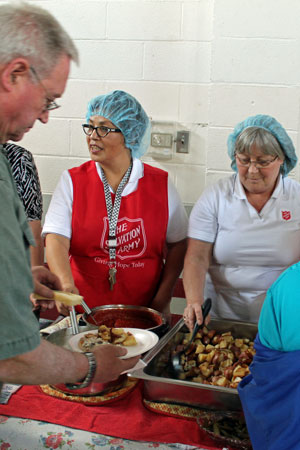 Supper co-ordinator Sylvia Thorburn, left, leads a large team of volunteers. “I'm amazed at how many people want to come and help volunteer," she says. "It's just—wow”
Supper co-ordinator Sylvia Thorburn, left, leads a large team of volunteers. “I'm amazed at how many people want to come and help volunteer," she says. "It's just—wow”
“We were looking for an opportunity to build full community,” explains Captain Ramsay. “We didn't want to have just a church dinner with corps people. But we also didn't want to have just a soup kitchen, where you've got people from the corps serving community people food and there's no interaction between the two groups.”
About half of those who come to the dinner are from the corps, while the rest come from the community. Some hear about the program through word of mouth, but many find out about it through other Salvation Army programming.
“If I know someone who would benefit from the dinner, I invite them to it,” says Thorburn, who works at the corps as a transition support worker, assisting clients with everything from court appearances to housing. “I sit down with them and they're my guests for the evening.”
Calvin Stricker, a long-time resident of the area, has been coming to the supper since it began.
“The food is awesome,” he says. “But more than that, it gets me out of the house. When you're not working—right now I'm not—you kind of look for every avenue you can to get out.”
For Stricker, who does casual work such as mowing lawns and washing dishes, just getting by in Swift Current can be difficult. As well as coming for the weekly dinner, he shops at the Army's thrift store and receives a hamper at Christmastime. Stricker is grateful for the meal, but comes mainly for the company.
“I know most of the people here and it makes me feel good,” he says. “If you have a bad day, you can talk to somebody.”
Teamwork
A member of the Swift Current corps since 1967, Ora Janzen is a regular at the dinner. “I have only missed one meal since it started,” she says with a smile.
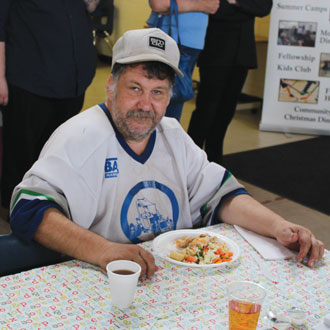 “I know most of the people here and it makes me feel good,” says Calvin Stricker
“I know most of the people here and it makes me feel good,” says Calvin Stricker
As with many other older attendees, Janzen usually brings her two grandchildren to the program.
“I live alone so it's nice to come out and visit with everyone,” she says. “You see different people—different than the ones who come to church. Every night, there's someone new.”
When the dinner wraps up around 6:30 p.m., Janzen is not one to leave right away.
“I always stay and help clean up afterward, taking the tables down and folding the tablecloths,” she says. “A few of us ladies have a good talk after the supper, while we help.”
Putting on a dinner of this scale would not be possible without dedicated volunteers. “It takes a lot of teamwork,” says Thorburn, who has 14 volunteers on her roster. As well as the Monday volunteers, Thorburn has a cooking group that meets every second Wednesday to make food, such as bread and casseroles, which are easily frozen, for Monday nights.
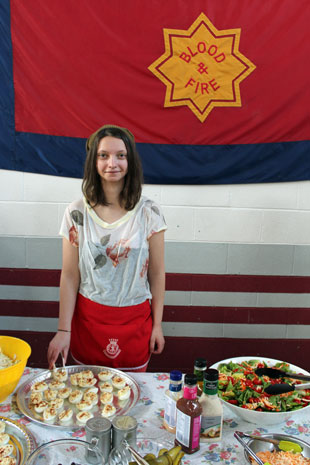 Volunteers are essential to the program's success
Volunteers are essential to the program's success
Many of these volunteers have no prior connection to the corps. “There are a lot of women who have time and want to do volunteer work in a specific place like The Salvation Army,” Thorburn says. “We also have people who really like to cook and just want to be in the kitchen.”
The Monday kitchen team is led by Wendell Cunningham, a journeyman chef with 20 years of experience. He volunteers with the Army in addition to his full-time job at a local long-term care facility.
“He came to The Salvation Army at the summer flea market where we have a booth, offering to do volunteer work,” Thorburn says. “He's taught us so much.”
“We all do it as a team,” Cunningham says modestly, “but I'm the one they'll come to with questions.” Cunningham also helps Thorburn develop meal plans, a particularly important task as they try to keep the cost of the meal to less than $2 per person.
Cunningham's leadership is much appreciated by volunteers such as Cindy Speir, who has also been with the program since the beginning. “And I'm enjoying every fine minute of it,” she says enthusiastically.
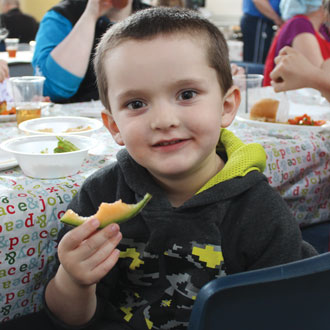 Jacob Harkin enjoys a slice of cantaloupe
Jacob Harkin enjoys a slice of cantaloupe
Speir works full-time as a dishwasher at a local restaurant, but she's happy to spend her free time in another kitchen at the corps. “I like being around people,” she says. “I'm more of a people person than a stay-at-home person. We always have a good time when we come here.”
On Mondays, Speir helps with food prep and she supervises the clean up at the end of the night. “It makes me feel good to help,” she says. “I feel like the more I help people, the more satisfaction I get for myself.”
Along with her regular volunteers, Thorburn has been approached by a number of local restaurants and other organizations that want to sponsor the Monday night dinners.
“I'm amazed at how many people want to come and help volunteer. It's just—wow,” she says. “Where do we put all these people? That's why we have to create other programs, like the Wednesday group. You don't want to turn people away because, for a lot of people, this is their place, this is therapy for them.”
Building the Kingdom
It's a long walk for Travis Mortensen from his house to the corps—about 30 blocks—but for the Monday night dinner, it's worth it.
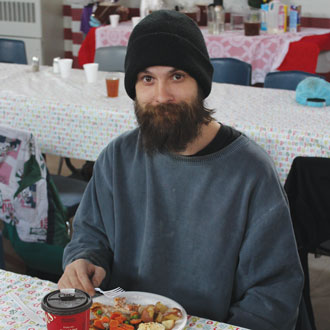 “I've met a lot of good friends here,” says Travis Mortensen
“I've met a lot of good friends here,” says Travis Mortensen
“Right now I'm on a fixed income and, on days like today when I don't have much food at home, it really helps out because, not only do I get to socialize with everybody, but I also get to eat,” he says. Mortensen, who does seasonal farm work, was invited to the program by Stricker, and has been coming to the program for several months.
“I've met a lot of good friends here,” he says. “I've been called antisocial, but when I come in here, they can't really call me that.
“Some days, I don't really get to see anybody. But I come here on Mondays for the supper and everybody's here and we all sit back, drink coffee and talk about our days,” he continues. “Everyone is friends here.”
“This supper provides an environment where people are able to break free of social constraints and build relationships,” concludes Captain Ramsay. “When you tear down the barriers, then you can build the kingdom of God.”




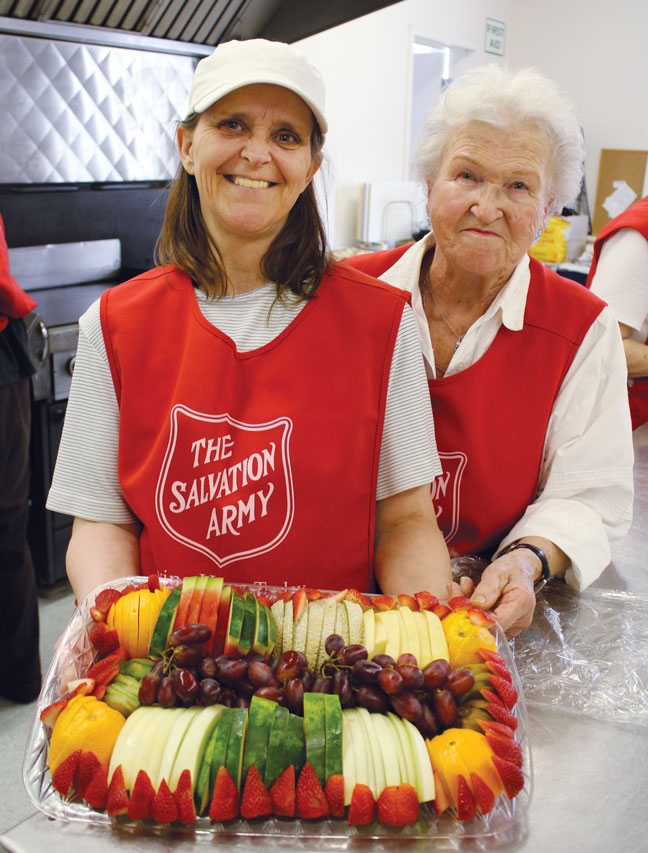
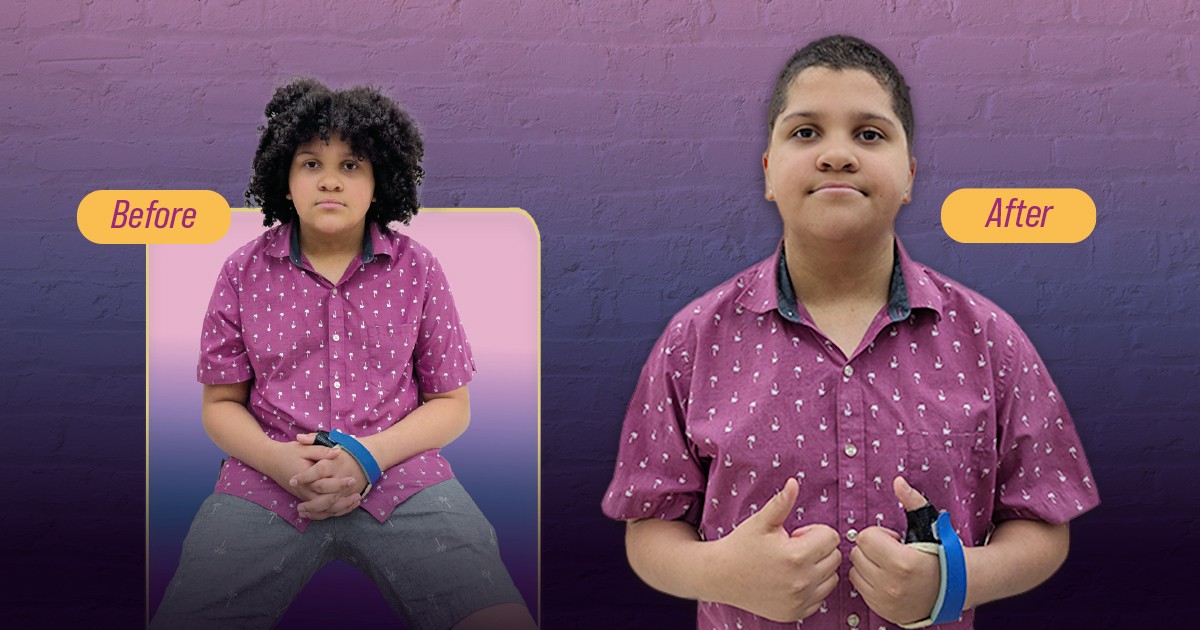

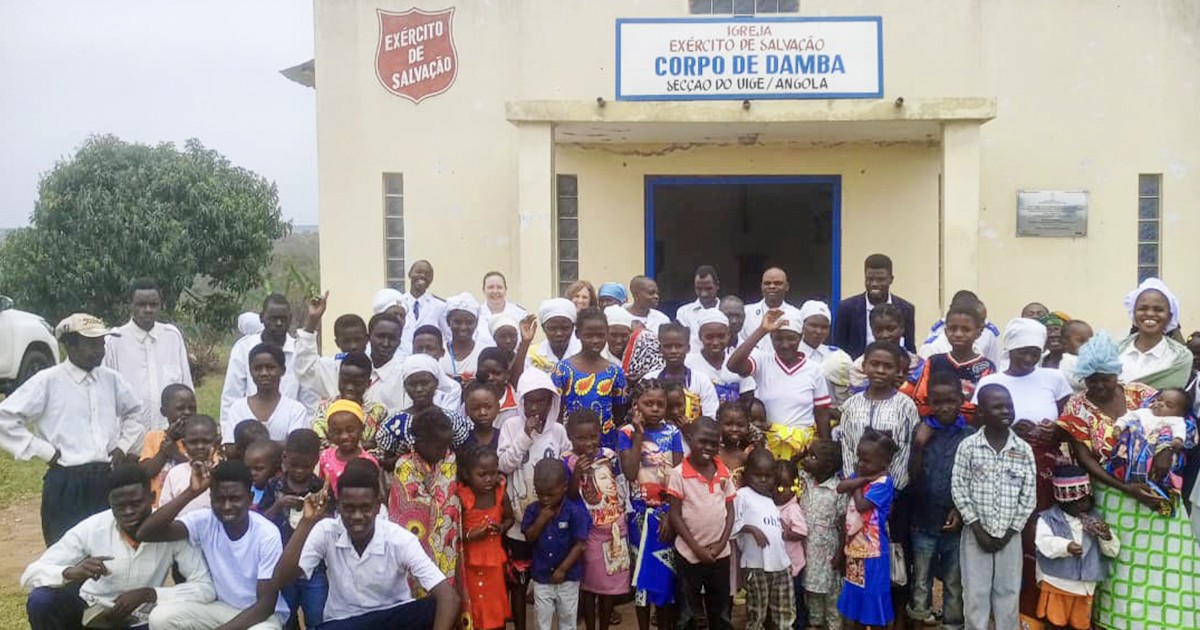


Leave a Comment